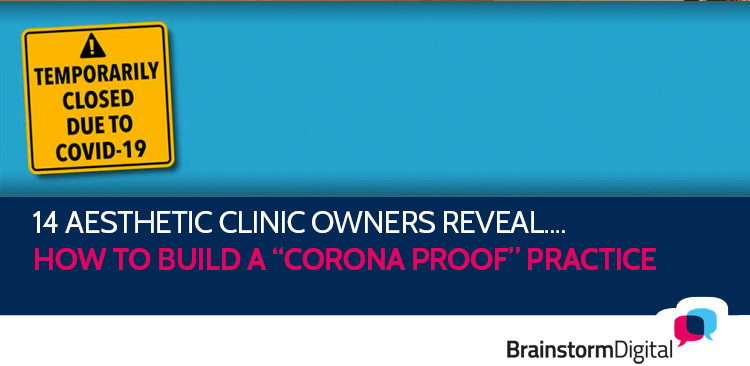
The Coronavirus crisis hit many aesthetic clinics and med spas in the gut.
If you were like most, you were not prepared for a complete shut-down, eliminating almost all your income in one fell swoop. (And why should you have been? The first Coronavirus wave took almost every business by surprise!)
Chances are, you scrambled and struggled to survive financially – as one very established clinic owner told me, “It was like an attack on my bank account.”
And though you were able to re-open once the Coronavirus restrictions were eased, things are still precarious.
You’ve had relatively little income coming in – and many bills still to pay. And while there is a lot of demand, operating is also a lot more complicated right now, with all the safety measures you’ve had to institute impacting the number of patients you’re able to see.
So how would you cope if there was another Coronavirus wave next winter, like so many scientists and governments are predicting?
What if the economy didn’t revive quickly, but we experienced a prolonged recession?
(Two very plausible scenarios!)
Would your practice survive another crisis?
To ensure that the answer is “yes”, you need to take action right now to put your clinic in the best possible position, should disaster strike once more.
We approached 14 aesthetic clinic and med spa owners across three continents, to find out what they are doing to make their practices more resilient…
…So that they can weather the next storm. Here’s what they said…
1. Diversify your offering
“After the crash of 2008, lots of people didn’t have any money,” says plastic surgeon Dr David Shafer of Shafer Plastic Surgery in New York City. “I started doing non-invasive treatments and injectables which at the time weren’t popular amongst other surgeons.
“Going 50/50 between surgical and non-surgical procedures gave me resilience when the economy changed” – and he recommends that every clinic owner finds ways to diversify their offering.
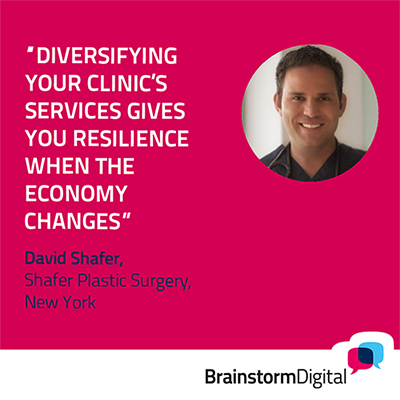
Nowadays, his practice has three components – surgical procedures, a skin / laser spa and metabolic aesthetics.
In many countries and states, “medically justified” or “essential” medical services were allowed to continue operating during the general Coronavirus shut-down. If those regulations apply in your area, Dr Shafer recommends incorporating such services into your practice, so you can ramp up those services and bring in some income during future Coronavirus waves.
“If you are purely cosmetic or a med spa, there’s nothing essential in your services and one government order can destroy your practice.”
Dr Bruce Katz, Medical Director of New York’s JUVA Skin and Laser Center – the world’s original medi spa – agrees.
“When you plan your investments, you would never put all your eggs in one basket – you diversify. And you should do the same when you plan your business,” he says.
His practice offers a wide range of aesthetic treatments, medical dermatology services and also conducts a wide range of clinical trials.
“Practices that only do aesthetics are endangering themselves. They’re busy looking for dermatologists to share their space because otherwise they can’t make any money, and they haven’t diversified for a rainy day…”
2. Create protocols to manage the next lockdown or quarantine
In this first Coronavirus crisis, clinics were taken by surprise – so in many cases, it took them weeks to organize their response, costing them both patients and money.
“Next time round, they need to move to ‘Coronavirus mode’ at the flick of a switch,” says Dr Sherif Wakil of Dr SW Clinics in London.

“They need to put together their Plan B right now, so – just like in a submarine attack – every member of staff knows their role and the transition is quick and smooth. You need a very robust system to do this, or your clinic will be in chaos once again.”
Vishul Gudka, owner of The Aesthetics Room in London, is already putting together the necessary protocols to manage another clinic shut-down.
“Since we’ve been through it once, we now know what we need to do if your clinic closes again. You need easy access to your client list in case you have to work from home again. You need to start communicating with them from Day 1 – this is the #1 priority to make sure your business survives – so have protocols for this….
“Make sure you are able to immediately start offering video consults, providing home treatments or whatever you are going to do to start earning money again.
“And make sure you also have protocols governing how you re-open your clinic again, when that’s possible. The last thing you want is to have to redesign your clinic again during lockdown. Build it now in a way that will enable clients to come back immediately on Day 1, after the lockdown is eased.”
3. Manage costs aggressively – and focus on high-margin treatments
“Government support has been incredible and that’s a key reason why many businesses have survived this crisis,” says Dr Sophie Shotter, founder of Illuminate Skin Clinics. “But we don’t know how long that support will last or whether there will be any support at all, if there is another lockdown.”
The key to surviving another crisis, therefore, is to ensure you have as much money in the bank as possible.
“Cash will be king to get out of this,” says Dr Shotter. “So while we’ve used some of the support the government has given us, we’ve tried not to dwindle it completely. We’ve also made sure we’ve come out of the lockdown debt-free, and will be building up a reserve fund when we can re-open, and money starts coming in again.”
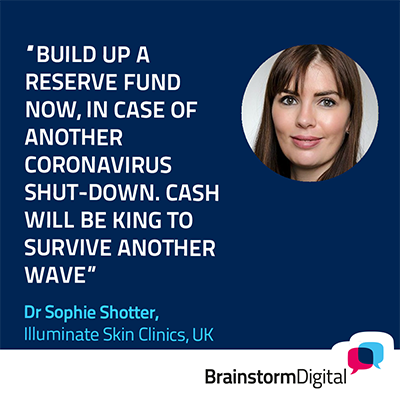
This is an approach that is being widely shared.
Vicki Whiteley is director of The Whiteley Clinic, a chain of clinics in London, Bristol and Guildford.
To protect themselves for the future, they have used the lockdown to review every single expense and overhead, and go over their accounts with their Finance Director in fine detail.
“We’ve looked at absolutely everything we do and asked why we’re still doing it, why we still have that piece of equipment, what do we still need that. We’re also looking at people’s roles and whether they’re being best utilized.
“We’ve gone through recessions before, and you have to focus on what’s popular and profitable. We’re becoming leaner and meaner – and slicker and smarter!”
Think now about what technology “will be financially viable and appropriate to have if there were another lockdown in the future,” suggests Dr Dev Patel, founder of Perfect Skin Solutions in the UK. “What is paid for every month and not used? This might even be a good time to sell technology you only use rarely, to build up your cash reserves.”
Focus on high-margin treatments for the foreseeable future.
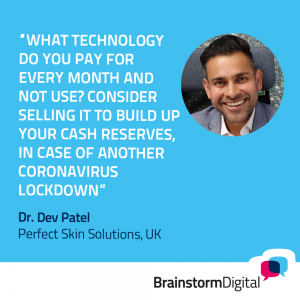 “We’re making decisions for the short-, medium- and long-term which will change our offering to our patient base, and will be very cautious about buying new technology because it could backfire in the event of another lockdown.”
“We’re making decisions for the short-, medium- and long-term which will change our offering to our patient base, and will be very cautious about buying new technology because it could backfire in the event of another lockdown.”
Of course, building up cash reserves is easier if you are profitable in the first place!
If not, recommends Dr Patel, now is the right time to bring in a business consultant.
“A whole business review is more important now than at any other time, and paying a few thousand for a few hours could really benefit you, instead of waiting until you’re in trouble.”
4. Introduce a membership scheme
One way to build up regular income? Get as many patients as possible onto a membership scheme, where they pay a monthly fee to access certain treatments as a discount, and enjoy other benefits.

That’s what Ashley Hilmes, owner of Vega Vitality in Boston, is working on right now.
“It means you can retain as many patients as possible,” and inoculate yourselfto a certain extent against economic peaks and troughs.
“We’re still working on the best way of doing it, but will probably end up with some kind of tiered membership mode – including membership at a premier level for clients who already spend a certain amount with us.”
5. Build up patient loyalty now…
“You need a loyal patient base” to get you through a crisis, says Dr Sophie Shotter. “Clinics which have relied on lots of offers and incentives end up with price-shoppers who likely will not stick with them in hard times.”
To build long-term resilience, her top priority is “to make sure that every patient who comes through our doors feels valued and that we have a real relationship with them, so that they always want to come back, even after we’ve been closed. The ability to build a waiting list gives you some guarantee you’ll have income flowing again.”
Clinics cannot simply assume that patients will remain loyal.
They have to think of new ways to go above and beyond, especially because the safety measures you now have to institute by definition place barriers between patients and practitioners, says Dr Shotter.
So, for example, she has replaced open days with online “coffee mornings” that build a sense of community, and launched an online magazine that provides value to patients, and strengthens their ties with her clinic.
“You have to look after the clients you’ve got because there are going to be less new ones around,” agrees Paul Wilkinson, until recently CEO of Courthouse Clinics, a chain of 11 doctor-led aesthetics clinics in the UK. “That means taking care of them to a very high standard – and maximizing their business, for example, making sure that when they leave they rebook before leaving the building.
“You cannot allow clients who do come back to you to drift away, and the only way they’ll stay with you is to give them a good service for a good price.”
6. …And advertise for new patients (if you can)
Many clinics will instinctively cut their marketing right now, but that’s a mistake, says Liz Cronin, founder of Revive Clinic in Ireland.
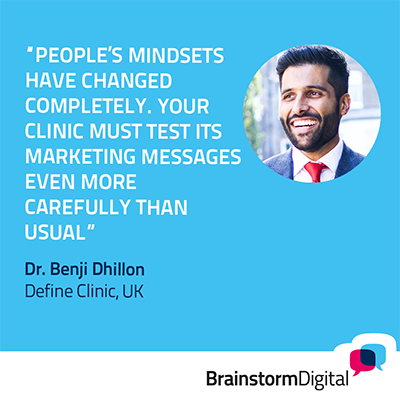
“Most people will cut their advertising spending right now. You need to stay visible – in fact, you’ll be more visible because some of your competitors will stop advertising. So use this valuable time to build your business.”
The more you can build up your patient list and your income now, the better off you’ll be if there is a resurgence of Coronavirus in the future, she says.
“Clinics that are afraid to invest in campaigns to generate new enquiries are at risk,” adds Dr Benji Dhillon, Cosmetic Surgery Director at Define Clinic, which combines facial aesthetics and cosmetic dentistry. “You can’t just depend on your existing database – there may be decay within that database.”
However, he cautions that messaging will have to change post-COVID-19, weaving in regular reminders that your clinic is safe and educating patients about PPE. And because “people’s mindsets have changed completely”, clinics will have to test messaging more carefully, and be attuned to changes in public mood.



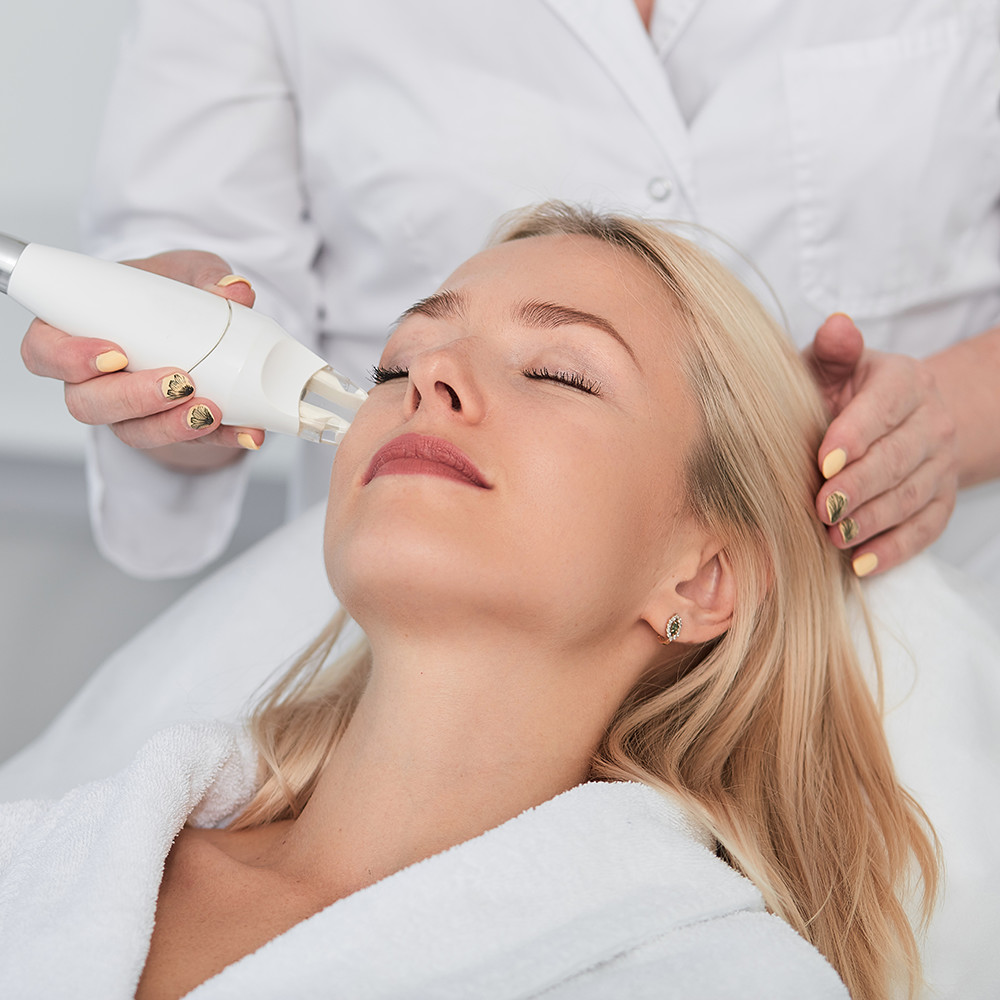

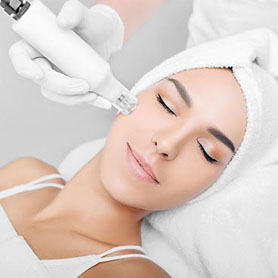
1 Comment. Leave new
good